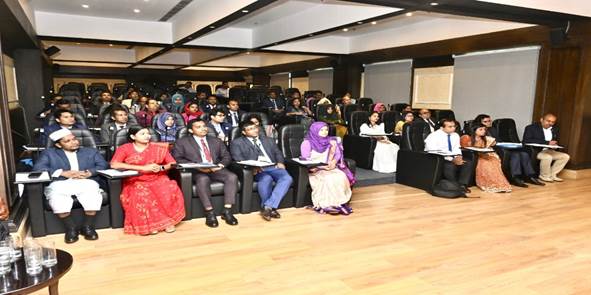NCGG completes training of 60th batch of Civil Servants of Bangladesh
Author: BI Bureau

New Delhi: The two–week 60th capacity building programme (CBP) for the civil servants of Bangladesh organised by the National Centre for Good Governance (NCGG) in partnership with the Ministry of External Affairs (MEA) concluded on June 2, 2023.
Following the completion of the first phase of CBP for 1,500 civil servants, the NCGG signed an MoU with the Government of Bangladesh to enhance the capacity of additional 1,800 civil servants by 2025. Post–Covid 19 pandemic, within the past two years, NCGG has already provided training to 517 officers of Bangladesh.
The 21st century is billed as the ‘Asian century.’ It offers an opportunity to South Asian countries to transform themselves into developed countries and enhance the quality of life of their citizens. To achieve this goal, it is important to foster mutual learning and concentrate on citizen-centric public policies and good governance by adopting e-governance.
Under the leadership of Prime Minister Shri Narendra Modi, the Indian government is actively engaged in these endeavours. It is also helping other developing nations in their endeavour to strengthen the capabilities of their civil servants and technocrats. In pursuit of this mission, the Ministry of External Affairs (MEA) has identified the National Centre for Good Governance (NCGG) as an ‘institution in focus.’
The valedictory session of the 60th CBP for civil servants of Bangladesh was chaired by Bharat Lal, Director General, the National Centre for Good Governance. In his address, he highlighted how these capacity building programmes are meticulously curated with the primary objective of facilitating the exchange of knowledge and innovative practices that have been successfully implemented in India to enhance governance and public service delivery.
The DG also spoke on the crucial role played by civil servants in society. He urged the civil servants to be sensitive and responsive to the needs of the people and ensure time-bound public service delivery. By adopting a people-centered approach and focusing on effective problem-solving, civil servants can contribute significantly to the well-being of the public and foster trust in the governance system.
He underscored that the ‘Asian century’ represents a transformative phase, where South Asian countries must emerge as major global players. With a rich cultural heritage, diverse economies, and a young and dynamic population, South Asia possesses the necessary ingredients for sustainable growth and development. The DG emphasized the importance of leveraging these strengths to address common challenges, uplift marginalized communities, and improve the lives of citizens in this region.
To expedite the socio-economic development in the Global South, it is imperative to prioritize the inclusion and empowerment of women. By ensuring high-quality public services and creating a favourable environment, women can actively participate in the workforce and engage in meaningful economic activities, thereby enhancing overall productivity. The DG urged civil servants to work for empowerment of women, guaranteeing equal access to opportunities and resources. /BI/



